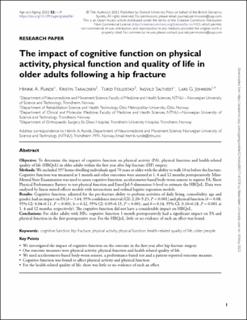The impact of cognitive function on physical activity, physical function and quality of life in older adults following a hip fracture
Runde, Henrik Alexander; Taraldsen, Kristin; Follestad, Turid; Saltvedt, Ingvild Tina; Johnsen, Lars Gunnar
Peer reviewed, Journal article
Published version
Permanent lenke
https://hdl.handle.net/11250/3068612Utgivelsesdato
2023Metadata
Vis full innførselSamlinger
Sammendrag
Objective: To determine the impact of cognitive function on physical activity (PA), physical function and health-related quality of life (HRQoL) in older adults within the first year after hip fracture (HF) surgery.
Methods: We included 397 home-dwelling individuals aged 70 years or older with the ability to walk 10 m before the fracture. Cognitive function was measured at 1 month and other outcomes were assessed at 1, 4 and 12 months postoperatively. Mini-Mental State Examination was used to assess cognitive function, accelerometer-based body-worn sensors to register PA, Short Physical Performance Battery to test physical function and EuroQol-5-dimension-3-level to estimate the HRQoL. Data were analysed by linear mixed-effects models with interactions and ordinal logistic regression models.
Results: Cognitive function, adjusted for the pre-fracture ability to perform activities of daily living, comorbidity, age and gender, had an impact on PA [b = 3.64, 95% confidence interval (CI): 2.20-5.23, P < 0.001] and physical function (b = 0.08, 95% CI: 0.04-0.11, P < 0.001; b = 0.12, 95% CI: 0.09-0.15, P < 0.001; and b = 0.14, 95% CI: 0.10-0.18, P < 0.001 at 1, 4 and 12 months, respectively). The cognitive function did not have a considerable impact on HRQoL.
Conclusions: For older adults with HFs, cognitive function 1 month postoperatively had a significant impact on PA and physical function in the first postoperative year. For the HRQoL, little or no evidence of such an effect was found.
Keywords: cognitive function; health-related quality of life; hip fracture; older people; physical activity; physical function.

